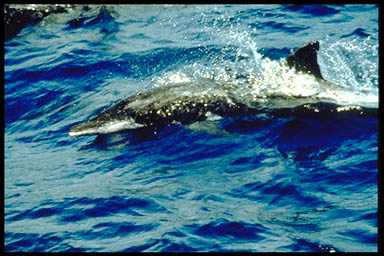|
| Query: Delphinidae | Result: 16th of 109 | |
Rough-toothed Dolphin (Steno bredanensis) - Wiki
| Subject: | Rough-toothed Dolphin (Steno bredanensis) - Wiki
| |

| Resolution: 384x256
File Size: 40597 Bytes
Upload Date: 2007:09:24 03:57:15
|
Rough-toothed Dolphin
From Wikipedia, the free encyclopedia
[Photo] Rough-toothed Dolphin, From NOAA, see http://nmml.afsc.noaa.gov/gallery/cetaceans/sb-6_rtdolphin.htm
The Rough-toothed Dolphin (Steno bredanensis) is a fairly large dolphin that can be found in deep warm and tropical waters around the world.
Naming and discovery
The Dolphin was first described by Cuvier in 1823. The genus name Steno, of which this species is the only member, comes from the Greek for 'narrow', referring to the species nose - which is a diagnostic characteristic of the species. The specific name honours van Breda who studied Cuvier's writings. The common name refers to the thin lines of enamel that run vertically down the dolphins teeth.
Physical description
The characteristic feature of the dolphin is its conical shaped head and slender nose. The flippers are set back further along the body than other similar dolphins (at sea this dolphin may be confused with the Spinner, Spotted and Bottlenose Dolphins.) The dorsal fin is pronounced.
The lips, throat and belly are pinky-white. The flanks are a light grey and the back and dorsal fin a much darker grey. The dolphin grows up to about 2.5m in length and weigh about 150kg.
The species is societal. Groups sizes are commonly as large as fifty and groups as large as 100 have been reported. The Dolphin has not been observed to bow-ride but does "skim" - swim with their heads and chin above the surface of the water.
Population and distribution
The distribution and population of the Rough-toothed Dolphin is poorly understood. Most of the research activity concerning the dolphin has been directed in the eastern Pacific Ocean where a population estimate of 150,000 has been obtained. There have been numerous reports from other warm seas, usually as a result of by-catches. Populations of unknown sizes exist in the Mediterranean and Caribbean Seas and the Atlantic, Indian and Pacific Oceans. Live sightings are almost universally made far off-shore beyond the continental shelf.
Conservation
The population is not believed to be threatened by human activities. A small number of individuals have been harpooned by Japanese whalers. Others have been caught in seine nets by trawlers fishing for tuna.
http://en.wikipedia.org/wiki/Rough-toothed_Dolphin
| The text in this page is based on the copyrighted Wikipedia article shown in above URL. It is used under the GNU Free Documentation License. You may redistribute it, verbatim or modified, providing that you comply with the terms of the GFDL. |
|
Comments |
|---|
| | Guest |
|
| The rough-toothed dolphin, Steno bredanensis, is unique among Delphinidae as the gradual slope of the front portion of its skull forms a long, narrow beak with no separation between the melon and the snout. The species is distributed in the tropical and subtropical waters of the Pacific, Atlantic, and Indian Oceans. |
^o^
Animal Pictures Archive for smart phones
^o^
|
|
|